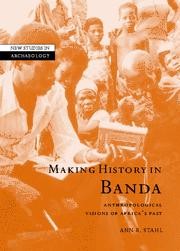Book contents
- Frontmatter
- Contents
- List of figures
- List of plates
- List of tables
- Preface
- 1 Refracted visions of Africa's past
- 2 Envisioning Africa's lived past
- 3 The past in the present: history-making in Banda
- 4 The political-economic context
- 5 Local life in the context of the Niger trade c. 1300–1700
- 6 The changing social fields of Banda villagers c. 1725–1825
- 7 The changing social fields of Banda villagers c. 1825–1925
- 8 Reflections: historical anthropology and the construction of Africa's past
- Notes
- References
- Index
- Other books published in the series
7 - The changing social fields of Banda villagers c. 1825–1925
Published online by Cambridge University Press: 22 September 2009
- Frontmatter
- Contents
- List of figures
- List of plates
- List of tables
- Preface
- 1 Refracted visions of Africa's past
- 2 Envisioning Africa's lived past
- 3 The past in the present: history-making in Banda
- 4 The political-economic context
- 5 Local life in the context of the Niger trade c. 1300–1700
- 6 The changing social fields of Banda villagers c. 1725–1825
- 7 The changing social fields of Banda villagers c. 1825–1925
- 8 Reflections: historical anthropology and the construction of Africa's past
- Notes
- References
- Index
- Other books published in the series
Summary
A shift to so-called “legitimate” trade occurred in the aftermath of abolition, though the internal slave trade continued – and perhaps intensified – with cash crop production. European industrial output increased dramatically because of the steam engine; but an economic downturn in the last quarter-century prompted Europe to seek protected outlets for its manufactured goods. Thus Britain consolidated its “New Empire,” expanding control over the Gold Coast and its hinterland. Asante's control of its northern provinces waxed and waned with changing circumstances in its capital. Trouble in Kumase translated into rebellion in the north. British officials, anxious to eliminate Asante's influence, and fearing encroachment from Germany to the east and France from the west, sent George Ferguson on several missions from 1892 to 1897 to conclude treaties with Asante's northern provinces (Arhin 1974). At the same time, Asante's northwestern provinces felt the effects of Samori's expansion into the Volta basin. In 1896 the British invaded Kumase and ousted Samori from the Volta basin. The Northern Territories of the Gold Coast were established in 1897, but colonial administration of the north was delayed by Britain's preoccupation with Asante. Nonetheless, this marked the beginning of colonial rule that became ever more present in the lives of Banda villagers in the first two decades of the twentieth century.
I begin by considering the lives of Banda peoples in the wake of Early Makala's abandonment.
- Type
- Chapter
- Information
- Making History in BandaAnthropological Visions of Africa's Past, pp. 189 - 214Publisher: Cambridge University PressPrint publication year: 2001



